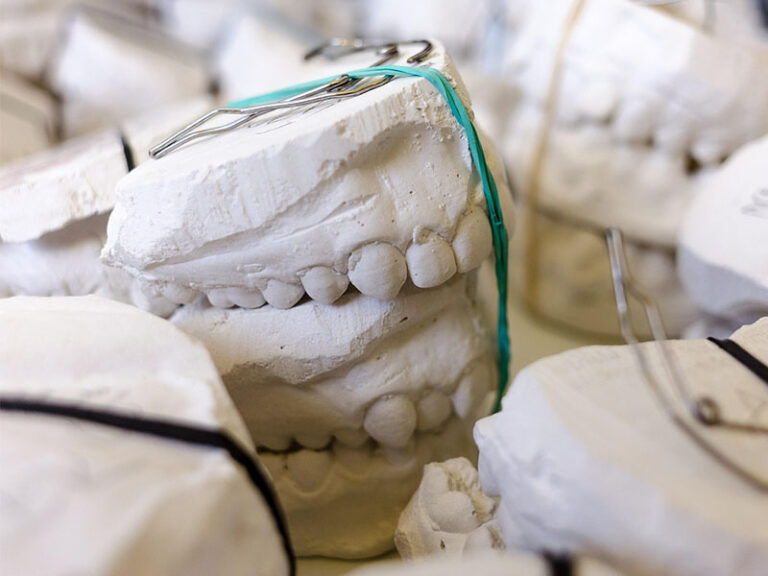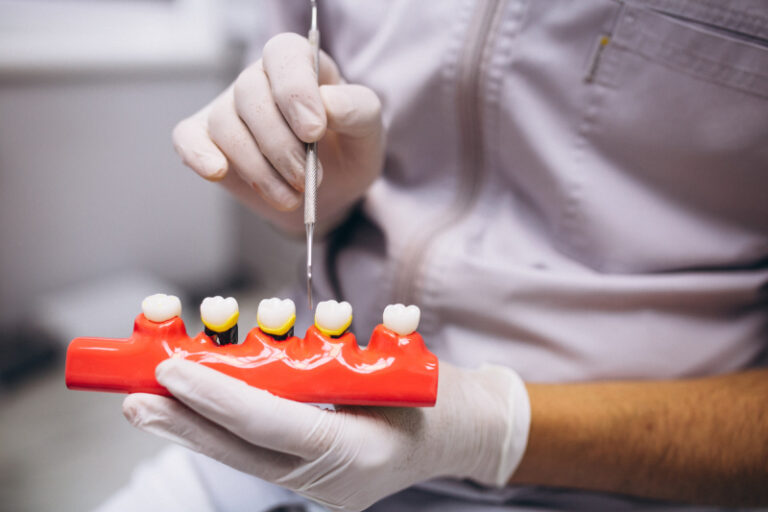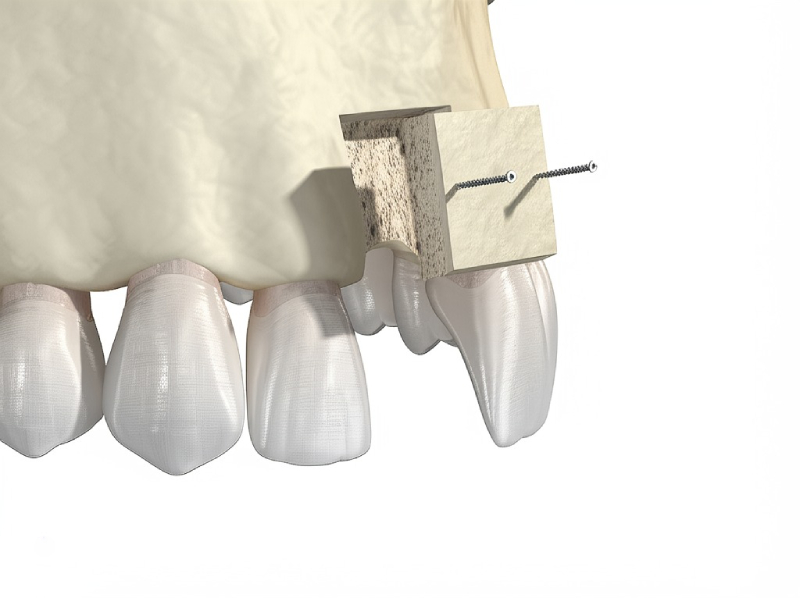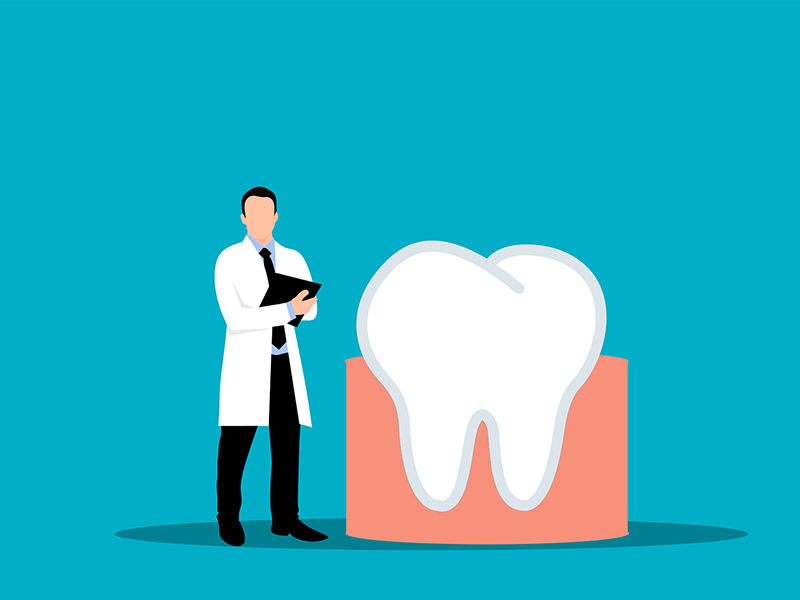
Cracked or Broken Tooth: Simple Guide to Causes, Symptoms, Treatments & Prevention for Relief
Did you just chip a tooth on some popcorn or feel a sharp pain when you bite into something? Maybe your child fell during a soccer game and has a broken tooth. If you’re thinking, “Now what?”, you’re not alone—and you’ve come to the right place.
Cracked or broken teeth can happen to anyone and turn a normal day into a dental problem. You might worry about pain, long-term problems, or how fast you need to see a dentist. Here’s the good news: Modern dental care offers safe, good solutions that can get you smiling (and eating!) again—often sooner than you’d think.
Table of Contents
What is a Cracked or Broken Tooth? (The Simple Science)
What Makes Up Your Tooth—And What Can Happen
Let’s start with a quick run-down: Your tooth isn’t just a chunk of bone. It has a few important parts:
- Enamel—the hard, shiny outside layer
- Dentin—the sensitive middle layer
- Pulp—the middle core, where your tooth’s nerves and blood flow are
- Root—the part that keeps the tooth in your jaw
When there’s a crack or break, this shield is damaged. The type and depth of the break changes what needs to be done next.
Some Common Kinds of Tooth Cracks and Breaks
Think of your tooth like a layered wall. When that wall cracks, the damage isn’t always the same:
- Craze Lines: Tiny, shallow cracks only in the enamel. Usually harmless and don’t hurt.
- Fractured Cusp: A piece of the tooth’s chewing part breaks off, often near a filling.
- Cracked Tooth: A crack runs from the biting surface down toward the root. May or may not go all the way.
- Split Tooth: The tooth splits into two clear parts—often after a crack is left alone for too long.
- Vertical Root Fracture: A crack starts at the root and moves up. Usually means the tooth needs to come out.
- Broken Tooth: A chunk of the tooth is gone. This can show the sensitive inside layers or even reach the nerve.
Knowing what type you have is the first step to fixing it.
Why Do Teeth Crack or Break? (Common Causes)
Accidents can happen to anyone, but some daily habits or problems can make your teeth more likely to break.
1. Bumps & Dental Accidents
- Sports Injuries & Falls: One wrong turn during a game or trip on the stairs can chip or break a tooth.
- Biting Hard Foods: That sneaky cherry seed, unpopped popcorn, or ice can surprise your tooth.
- Car Accidents: A sudden hit can break teeth.
2. Everyday Habits & Other Problems
- Bruxism (Teeth Grinding or Clenching): This is an automatic, often nighttime habit that puts a lot of force on your teeth—sometimes up to 200 pounds per square inch on your molars.
- Big Fillings: Old or large fillings can make the tooth around them weaker.
- Getting Older: As we age, enamel gets thinner, so cracks are more likely.
- Quick Temperature Changes: A hot sip after eating something cold can make enamel expand and shrink, causing small cracks.
- Cavities & Previous Dental Work: Cavities and old treatments can make teeth break more easily if not protected right.
Fun fact: The American Dental Association says up to 70% of cracked teeth happen because of grinding or clenching. If you wake with a sore jaw or headache, ask your dentist about a mouthguard.
Symptoms to Watch For (How To Tell If You Need Help)
Not every cracked or broken tooth shouts for help—but ignoring the signs can cause bigger, pricier problems later.
What You Might Notice
- Sharp Pain When Biting or Chewing: If it hurts when you bite, then stops, this can mean a crack.
- Pain When Releasing the Bite: You chew, you let go, then—ouch.
- Sensitivity: If your tooth hurts with hot, cold, or sweet foods, a crack may be why.
- Swelling or Red Gums Around the Tooth: Infection can happen fast if the crack is deep.
- Visible Crack, Break, or Missing Piece
- Color Change: Tooth can look gray, yellow, or dark—sometimes a sign the nerve is hurt.
- Bad Breath or Bad Taste: Could mean an infection.
- No Obvious Signs: Some cracks you can’t see, but they still hurt.
Tip: Don’t ignore mild aches because they come and go—cracks often start small but grow if left alone.
How Dentists Figure Out What’s Wrong (Getting a Clear Answer)
Cracked teeth can hide. What you feel may not match what you see, even in the mirror. Here’s how the dentist checks:
Tools and Tests Dentists Use
- Looking Closely: The dentist will check your tooth with a bright light, mirror, and maybe special glasses.
- Bite Test: You may be asked to bite on a stick to see which tooth hurts most.
- X-rays: Small cracks may not show, but these help find deeper problems like infection or bone loss.
- Light Test: Shining a strong light through the tooth can show hidden cracks.
- Dye Test: A colored dye may be used to outline hard-to-see cracks.
- Pulp Test: Checks if the nerve inside your tooth is still good.
Why so many tests? Because the exact crack pattern decides the best fix—and whether you can keep the tooth.
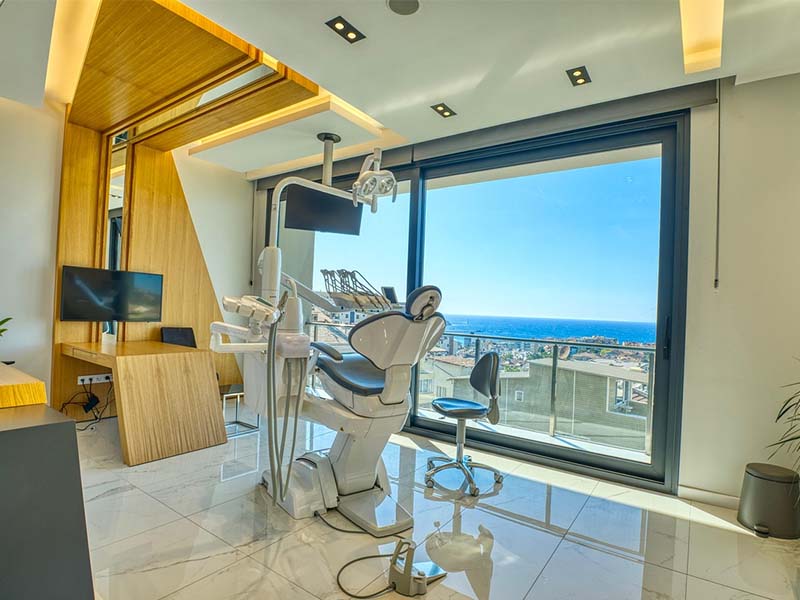
Treatment Options: From Quick Fixes to Long-Term Repairs (What You Can Do About It)
How do you fix a cracked or broken tooth so you can feel alright again? Here’s what your dentist may suggest, depending on your break.
1. Bonding—Quick Fix for Small Cracks or Chips
What is it? The dentist adds a tooth-colored resin to the crack, shapes it, then hardens it with a special light.
Best for: Small chips, shallow cracks, and minor cosmetic fixes.
- Pros: Quick (one visit), cheaper ($100-$600 per tooth), blends in.
- Cons: Not as strong as other types, may need to be fixed up every few years.
2. Crowns—For Medium Cracks or Breaks
What is it? A cap covers and protects the whole tooth.
Best for: Teeth with bigger cracks, lost pieces, or that are weaker after big fillings.
- Types: Ceramic, metal, or a mix.
- How it Works: Dentist shapes the tooth, takes a scan or mold, and fits a temp crown. The real crown goes on a week or two later.
- Success: Crowns last 10+ years in about 90% of cases.
- Cost: $800-$2,500 per tooth, based on material and where the tooth is.
- Pros: Lasts long, stops more breakage, lets you chew well.
- Cons: Needs more tooth filed away, costs more than bonding.
3. Root Canal—Needed When the Nerve is Hurt
What is it? If the crack goes to the pulp (inside nerve), your dentist removes the bad nerve, cleans the tooth, and seals it up. You’ll usually need a crown after.
- When Used: Deep cracks, lasting pain, or signs of infection (like swelling or tooth turning dark).
- Success: 85-95% work well.
- Cost: $700–$2,000 per tooth.
- Pros: Saves the tooth, stops pain, lets you keep eating normally.
- Cons: Tooth might feel sore a bit after, may turn slightly darker in color.
4. Taking the Tooth Out—Last Option
Bad cracks (like splits at the root or the tooth breaking in half) can’t be fixed. The dentist may need to pull the tooth.
- What Next: Replacement with an implant (the best option), bridge, or removable partial denture.
- Outlook: Implants work well—over 95% are good for the long run.
Other Choices
- Veneers: Thin covers for small cracks in front teeth.
- Onlays/Inlays: Cover just the broken part, good for chewing teeth.
- For Pain: Store-bought painkillers, over-the-counter dental cement, special medicine from the dentist if needed.
First Aid: What To Do Right After a Tooth Breaks (Immediate Steps)
Okay, your tooth just cracked or broke. What should you do now?
- Rinse Gently: Use warm water to clean your mouth. Don’t use water that’s too hot or cold if your tooth is sensitive.
- Apply Cold Compress: This helps swelling. Use a bag of frozen veggies or an ice pack wrapped in a towel, pressed to your cheek for 10-15 minutes.
- Stop Bleeding: If your gum bleeds, bite down on clean gauze or a tea bag.
- Save the Pieces: If a piece of tooth fell out, keep it in milk or salt water. Take it to your dentist.
- Ease the Pain: Take store-bought painkillers (like acetaminophen). Don’t put aspirin on your gum—it can hurt your mouth.
- Cover Jagged Edges: Use orthodontic wax (from the store) or sugarless gum to keep from cutting your tongue or cheek.
- Don’t Chew on the Broken Side: Until your dentist checks it.
- Call the Dentist Fast: Many offices have same-day slots for emergencies.
DON’T:
Don’t wiggle or poke the tooth. Don’t try to glue it back yourself. At-home fixes (even dental cement) are just for now.
If you have a lot of pain, swelling, fever, or trouble swallowing, go to the ER—these can be signs of a bad infection.
How To Prevent Future Tooth Injuries (An Ounce of Prevention!)
Fixing a cracked tooth takes time and money—so why not prevent it? Here’s how to help your teeth stay strong:
Top Prevention Tips
- Wear a Mouthguard: Custom ones are best if you play sports or grind your teeth at night.
- Don’t Bite Hard Stuff: Ice, hard candies, unpopped popcorn, even pen caps can break teeth.
- Don’t Use Teeth as Tools: Use scissors, not teeth, to open things.
- Stop Grinding: If you wake up with jaw pain, ask your dentist about a nightguard and ways to lower your stress.
- Get Regular Dental Checks: The dentist can catch problems early, before things get bad.
- Brush Well: Good oral care (brushing twice a day, flossing, using fluoride) keeps enamel strong.
- Check Old Fillings: Replace big or leaky ones before they crack your tooth.
What To Expect After Treatment (and How To Heal)
You fixed your cracked or broken tooth—now what? Healing usually goes smoothly, especially if you follow your dentist’s advice.
Healing Tips
- Eat Soft Foods: Go easy for a few days—mashed potatoes, yogurt, scrambled eggs, smoothies. Stay away from sticky or hard foods.
- Brush & Floss: Clean your teeth gently near the repair, keep flossing, and rinse with salt water if dentist says so.
- Expected Sensitivity: Some teeth are sensitive after fixing. It should fade, but tell the dentist if it stays around.
- Follow Up: Don’t skip checkups for your crown or repair.
- Look Out For: Ongoing pain, swelling, repairs that feel loose, or signs of infection (bad taste, pus, fever). Tell your dentist if you see any of these.
Longer-Term Outlook
With quick care and solid habits, most cracked or broken teeth work and feel almost like new. If you had a root canal or crown, the fix can last years—even decades.
Do You Always Need a Dentist? (Who Needs What)
If you have a tiny chip or crack with no pain—especially on a baby tooth or just for looks—sometimes bonding or smoothing is enough. But deep cracks, pain, or showing the nerve means you need a dentist right away.
You might get:
- Bonding or Veneer: If the tooth is mostly okay and the break is small.
- Crown or Root Canal: If the problem is bigger but can be saved.
- Pulling & Replacing the Tooth: If it is split, the root is cracked, or it can’t be fixed.
Talk openly with your dentist about costs, what they recommend, and how long things take to heal. If you’re scared (lots of people are!), don’t worry—sedation and gentle care can make it easier.
Main Points: Your Recovery Checklist
Let’s sum it up with some simple reminders:
- Cracked and broken teeth are common, but need care fast to avoid pain and infection.
- Don’t ignore pain while biting, visible cracks, or swelling.
- Treatments go from simple bonding to crowns, root canals, or new teeth—your dentist will help you decide.
- Quick at-home care—rinse, protect, and call the dentist—can reduce problems.
- Wearing a mouthguard, skipping hard foods, and regular checks help keep your teeth safe.
- Most fixes last years—or even a lifetime—with good care.
Your Next Steps: Take Care of Your Teeth
If you think you have a cracked or broken tooth—or you’re hurting—don’t wait and hope it gets better. Acting quickly is the best chance to save your tooth and keep your smile bright.
Call your dentist or a dental emergency office soon as you can. Unsure? It’s always alright to ask questions. Every cracked tooth is a little different, but with the right advice and care, you’ll be back to eating, laughing, and living—pain free.
Questions People Often Ask
Q: Can a cracked tooth heal up by itself?
A: No. Teeth can’t heal cracks on their own. Only fast dental treatment can fix it and stop pain or infection.
Q: How long can I wait to fix a broken tooth?
A: The longer you wait, the greater the risk of infection, nerve damage, or losing the tooth.
Q: Will insurance pay for cracked or broken tooth repairs?
A: Most plans pay for needed repairs like crowns or root canals, but may not cover all cosmetic repairs like veneers. Ask your dentist’s office to check before getting work done.
Q: Does a cracked tooth always mean root canal?
A: Not always! If the crack is small and doesn’t reach the nerve, bonding or a crown might do. Root canals are only for deep or painful cracks—or if there’s an infection.
Final Word
Your teeth work hard every day—so don’t let a crack or break stop you from enjoying your life. With today’s dental tools, almost every cracked or broken tooth can be fixed or replaced in a way that looks and feels good. The smartest step? Call your dentist right away. You’re on the path to a strong, happy smile!
Sources:
- American Dental Association (ADA)
- American Association of Endodontists (AAE)
- International Association of Dental Traumatology (IADT)
- Some reviews & studies

